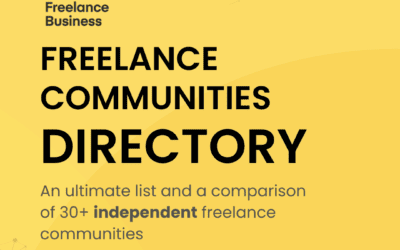We had a fun and insightful talk with Katrina Cobb and Nishant Aggarwal from NOMAWO about growing your freelance business. If you’d like to see our full talk click here.
What does it take to scale a freelance business?
Think like a business owner, not a freelancer. This involves learning to work on your business, not only in your business. You need to learn to manage your work efficiently, systemize processes and know what work to outsource to others.
Ask for help and support – you shouldn’t go through it alone. There are always people with more experience who will be willing to help. Finding a supportive community is a winning strategy, and NOMAWO can be a great resource for that.
What skills make freelancers successful?
For Nishant, the biggest challenge was learning the art of selling yourself. You have to be comfortable about “bragging” and showing off your value, he said.
Katrina added that you need to learn to price properly and establish a good margin. This margin will allow you to take vacations, outsource, and make your business sustainable. The best way to do it is to have value-based pricing, which depends on the value your work gives to your clients, not on the time you spend on it. Developing financial, project management, and time management skills is necessary, as well as the ability to network – you can’t grow a business in incognito. Aligning your decisions with what you want in life, and being good at what you do is advantageous.
Do you need a coach?
Good coaches help you create what you want from your business. They know how to pull the best out of people and how to make them great humans. A coach can help you get in the right mindset for growing your business, offer new perspectives to your work, fill your knowledge gaps, and set the right goal for what you want to achieve. Furthermore, coaches can help you overcome emotional influences – during challenging moments, many freelancers make decisions out of emotional cues, not from a strategic view. Having a coach’s rational opinion can help you avoid that.
A common concern that was raised by the community was that coaches can be too expensive for freelance individuals. If you want your business to grow, however, you must look at coaching as an investment in your work, not an expense. There are also affordable group coaching services that offer personal support. You can get started with NOMAWO today for free.
The best question to ask yourself before hiring a coach is whether they share the same values for the business. If you have a more high-energy hustle approach, you wouldn’t work well with a coach that focuses on flow and intuition. You need to resonate with their message.
Nishant warns against coaches with a 5 or 7 step system that “works on 100% of people”. A strategy needs to be tailored to your specific goals and purposes, not a pre-made plan.
Katrina doesn’t think they need to be from the same industry, as long as they are able to solve the problem you’re experiencing. There’s a lot of psychology in coaching – coaches need to know how people think, react and communicate.
Our guests also revealed what the difference between a mentor and a coach is: mentors usually have been in your industry and have experience to share. Coaches give clarity and keep you in check.
If you think coaching isn’t for you, there are other options – books, courses, etc, or you can go the trial-and-error route. Lean into peer groups and networking – you can learn from every interaction, from other people in different circumstances. Having a coach when you start can make the early stages easier, and avoid having to make a lot of mistakes early.
Covid has helped coaching grow, as new people are entering the freelance market, and there are more opportunities than ever to coach and be coached.
Why peer-to-peer learning is important
Professionals, and especially freelancers, are stronger when they learn from each other. With isolation growing due to Covid, having a community to reach out to and learn from can have a big morale and confidence boost.
When Nishant leaned into consulting in 2020, he found a lack of resources and support. To solve that problem he founded NOMAWO with the mission of supporting freelancers to grow and scale their business. He says a peer-to-peer community like this needs to be natural, but also have a structure. You can learn more about NOMAWO’s approach to peer-to-peer communities in our talk.
A 3-step plan for your growth
Finally, we asked Nishant and Katrina to make a 3 step plan for people to start thinking about growing their business:
Katrina suggested:
- Find what support works for you
- Take a look at your business structure – are you building something that has the potential to grow? If not, put it on paper, structure it and adjust it.
- Spend time working on your business and treat it as a business. It is the biggest revenue generator, not the individual projects you’re working on.
Nishant added:
- Think about something with the mindset of a CEO, not just a solo hustler.
- He shared a quote: “I thought I was too tired of asking for help, but I realized I was just asking the wrong people“. Reach out for help and invest in relationships and networks.
- Think about making big changes and make 2021 your year!
To close, we’d like to thank NOMAWO again for their insight, and for giving you a special 10% discount to join the NOMAWO Club. “I truly believe that freelancing is the future of work,” Nishant concluded, “and we are seeing a lot of research and data on this and down the line, it will be more of the norm.”




